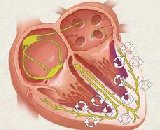Arrhythmia
Cardiac Arrhythmia

Arrhythmia, also known as cardiac dysrhythmia or irregular heartbeat, is a group of conditions in which the heartbeat is irregular, too fast, or too slow. There are four main types of arrhythmia: extra beats, supraventricular tachycardias, ventricular arrhythmias, and bradyarrhythmias. Extra beats include premature atrial contractions and premature ventricular contractions. Supraventricular tachycardias include atrial fibrillation, atrial flutter, and paroxysmal supraventricular tachycardia. Ventricular arrhythmias include ventricular fibrillation and ventricular tachycardia. Arrhythmias are due to problems with the electrical conduction system of the heart. A number of tests can help with diagnosis including an electrocardiogram (ECG) and Holter monitor.
Model for Arrhythmia is useful in our understanding of the mechanisms of ventricular arrhythmia and of antiarrhythmic and proarrhythmic agents. Models can be induced by aconitine with intravenous in jection,barium chloride and calcium choloridc, by chloroform and chloroform-adrenaline and cardiac glycoside etc..
Organism species: Mus musculus (Mouse)
- Disease model DSI506Mu01 Mouse Model for Arrhythmia In Stock
- Disease model DSI506Mu02 Mouse Model for Arrhythmia In Stock
- Customized Service n/a Tissue of Arrhythmia (If Necessary) Tissue Customized Service Offer
- Customized Service n/a Serums of Arrhythmia (If Necessary) Serums Customized Service Offer
Organism species: Rattus norvegicus (Rat)
- Disease model DSI506Ra02 Rat Model for Arrhythmia In Stock
- Disease model DSI506Ra01 Rat Model for Arrhythmia In Stock
- Disease model DSI506Ra03 Rat Model for Arrhythmia In Stock
- Disease model DSI506Ra05 Rat Model for Arrhythmia In Stock
- Customized Service n/a Tissue of Arrhythmia (If Necessary) Tissue Customized Service Offer
- Customized Service n/a Serums of Arrhythmia (If Necessary) Serums Customized Service Offer
Organism species: Cavia (Guinea pig )
- Disease model DSI506Gu01 Cavia Model for Arrhythmia In Stock
- Customized Service n/a Tissue of Arrhythmia (If Necessary) Tissue Customized Service Offer
- Customized Service n/a Serums of Arrhythmia (If Necessary) Serums Customized Service Offer
Organism species: Oryctolagus cuniculus (Rabbit)
- Disease model DSI506Rb01 Rabbit Model for Arrhythmia In Stock
- Disease model DSI506Rb02 Rabbit Model for Arrhythmia In Stock
- Customized Service n/a Tissue of Arrhythmia (If Necessary) Tissue Customized Service Offer
- Customized Service n/a Serums of Arrhythmia (If Necessary) Serums Customized Service Offer
Organism species: Felis catus; Feline (Cat)
- Customized Service n/a Model for Arrhythmia Disease Model Customized Service Offer
- Customized Service n/a Tissue of Arrhythmia (If Necessary) Tissue Customized Service Offer
- Customized Service n/a Serums of Arrhythmia (If Necessary) Serums Customized Service Offer
Organism species: Canis familiaris; Canine (Dog)
- Disease model DSI506Ca01 Canine Model for Arrhythmia In Stock
- Customized Service n/a Tissue of Arrhythmia (If Necessary) Tissue Customized Service Offer
- Customized Service n/a Serums of Arrhythmia (If Necessary) Serums Customized Service Offer


